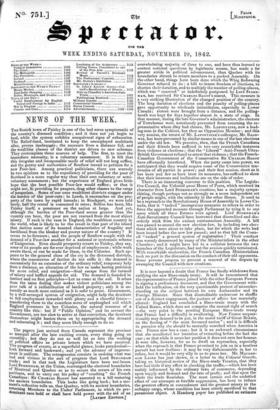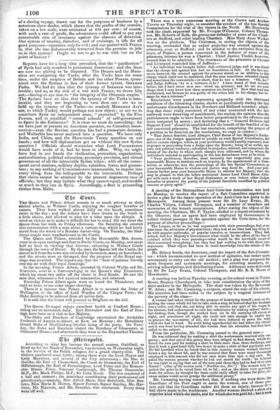It is now beyond a doubt that France has finally
withdrawn from ratifying the new Slave-trade treaty. It will be remembered that the representative of France joined with the other European Powers in signing a preliminary document, and that the Government with- held the ratification, on the very questionable pretext of misunder- standing on the subject between its own Ambassador and its Foreign Minister. Since that discreditable endeavour to shuffle out of a distinct engagement, the posture of affairs has materially altered: England has concluded a Slave-trade treaty with the United States, which does not comprise the mutual right of search —the very point in the pending European Slave-trade treaty that France had a difficulty in swallowing. Now France unques- tionably may demand to be put, in the moral tariff of Great Britain, on the footing of "the most favoured nation" ; and it is difficult to perceive why she should be mutually searched when America is not. France now has a case ; but it is an awkward circumstance that she manifested her intention of retracting before she had the case ; so that while it saves her position it does not save her honour. It were idle, however, for us to dwell on reproaches, especially when the reproach is that France promised to join us in a bootless pursuit but now declines : it may be very dishonourable in her to refuse, but it would be very silly in us to press her. Mr. Macoas- GOR LAIRD has just shown, in a letter to the Colonial Gazette, taking an historical review of the Slave-trade Treaties, that they have had little if any effect in checking the traffic,—which has been mainly influenced by the ordinary laws of commerce, depending upon supply and demand and the rate of profit; and that upon the whole the trade flourishes. The most certain and the undenied effect of our attempts at forcible suppression, has been to induce the greatest efforts at concealment and the greatest misery to the unhappy cargo, whose condition has been utterly sacrificed to that paramount object. A Hamburg paper has published an estimate of a slaving voyage, drawn out for the purposes of business by a notorious slave-dealer, which shows that the profits of the venture, taken on a low scale, were estimated at 434 per cent : of course, with such a rate of profit, the adventurers could afford to pay any conceivable rate of insurance against the chances of detection. Our system of treaties, therefore, and of cruisings, is idle for all Food purposes—operative only for evil ; and our quarrel with France is, that she has dishonourably retracted from the promise to join us in that system ! Ought we not to go to war with her on the point of honour ?



























 Previous page
Previous page